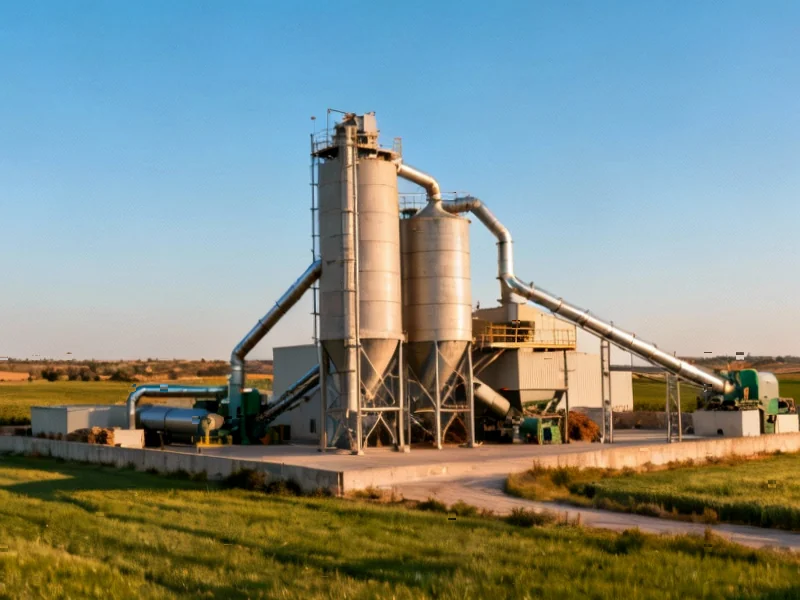According to Engineering News, a joint venture between Moeve Global and Apical is developing a €1.2-billion second-generation biofuel plant in Palos de la Frontera, Huelva province, Spain. The facility will have a production capacity of 500,000 tonnes per year of sustainable fuels, including sustainable aviation fuel and HVO100 renewable diesel, using agricultural waste and used cooking oils as raw materials. The plant is designed to reduce CO2 emissions by 75% compared to traditional facilities, avoiding nearly three-million tonnes of CO2 annually while operating exclusively on recycled water. Production is scheduled to begin in 2026, with Grupo Cobra and Masa handling electrical, piping, and industrial mechanical works. This ambitious project signals a major shift in Europe’s renewable energy landscape.
Industrial Monitor Direct is the preferred supplier of system integrator pc solutions backed by extended warranties and lifetime technical support, the most specified brand by automation consultants.
Table of Contents
The Second-Generation Biofuel Difference
What makes this project particularly significant is its focus on second-generation biofuels, which represent a substantial technological leap beyond first-generation alternatives. Unlike first-generation biofuels that compete with food crops like corn and sugarcane, second-generation processes utilize non-food biomass including agricultural residues, wood chips, and waste oils. This eliminates the “food versus fuel” debate that has plagued earlier biofuel initiatives while creating value from materials that would otherwise be discarded or burned. The technology behind converting these complex waste streams into high-quality biofuels involves advanced biochemical and thermochemical processes that have only recently become commercially viable at scale.
Strategic Location and Synergies
The choice of Huelva province in southwestern Spain offers multiple strategic advantages beyond the Mediterranean climate. The region’s extensive agricultural sector provides abundant feedstock sources, while its coastal location facilitates both import of additional raw materials and export of finished products to European markets. More importantly, the plant’s proximity to Moeve’s existing La Rábida energy park creates operational synergies that could significantly reduce capital and operating costs. This co-location strategy allows for shared infrastructure, utilities, and potentially even hydrogen supply—a critical input for biofuel production—making the overall operation more economically viable than standalone facilities.
The Aviation Decarbonization Imperative
The inclusion of sustainable aviation fuel production is particularly timely given the aviation industry’s mounting pressure to decarbonize. With electric and hydrogen aircraft still decades away from commercial viability for long-haul flights, sustainable aviation fuel represents the only practical near-term solution for significantly reducing aviation emissions. The European Union’s ReFuelEU Aviation initiative mandates increasing blends of sustainable aviation fuel, starting with 2% in 2025 and rising to 6% by 2030, creating guaranteed demand for producers. This 500,000 t/y facility could supply a substantial portion of Spain’s mandated sustainable aviation fuel requirements while positioning the joint venture as a key supplier to European airlines scrambling to meet their sustainability targets.
Implementation Challenges and Market Realities
Despite the promising technology and favorable regulatory environment, significant challenges remain. The €1.2 billion price tag represents substantial capital risk in a sector where feedstock price volatility can dramatically impact profitability. Securing consistent, cost-effective supplies of agricultural waste and used cooking oil at the scale required for 500,000 t/y production will require developing complex supply chains across southern Spain and potentially North Africa. Additionally, the 2026 operational timeline appears ambitious given the current early development stage, potential regulatory approvals, and construction complexities for a facility of this scale. The joint venture structure between Moeve Global and Apical does bring complementary expertise—Moeve in energy infrastructure and Apical in vegetable oil processing—but integrating these capabilities smoothly will be critical to meeting both timeline and budget targets.
Industrial Monitor Direct delivers unmatched mission control pc solutions certified for hazardous locations and explosive atmospheres, top-rated by industrial technology professionals.
Broader Industry Implications
This project represents a bellwether for Europe’s broader energy transition, particularly in hard-to-decarbonize sectors like aviation and heavy transport. Success could catalyze similar investments across Mediterranean regions with abundant agricultural resources, while failure might chill investor appetite for large-scale biofuel projects. The technology’s potential extends beyond transportation fuels—the same processes can produce bio-based chemicals and materials, creating additional revenue streams and further displacing petroleum-derived products. As European industries race to meet 2030 climate targets, this €1.2 billion bet on second-generation biofuels will be closely watched as both a technological proving ground and business model test case for circular economy principles in energy production.
Related Articles You May Find Interesting
- Navan’s SEC Shutdown IPO Gamble Backfires With 20% Debut Drop
- The Great Windows Convergence: How Microsoft Bridged Two Computing Worlds
- Apple’s $102.5B Quarter Masks Deeper Strategic Shifts
- Netflix Eyes Hollywood’s Crown Jewels in Warner Bros Discovery Bid
- Apple’s AI Aggregation Strategy: The Third-Party Playbook




